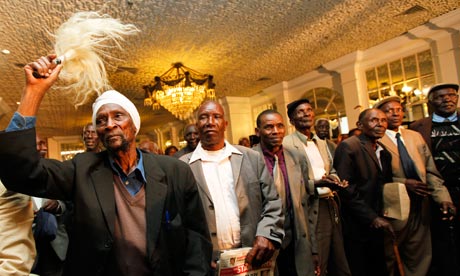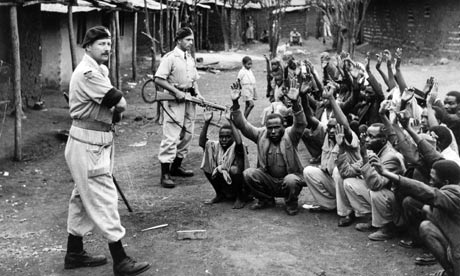British colonial violence was brutal, and systematic. If there is any justice, the Mau Mau's stunning legal victory should be the first of many

Kenyans tortured during the Mau Mau rebellion are to receive compensation payments from the British government. Photograph: Dai Kurokawa/EPA
On Thursday nearly 200 elderly Kikuyu people travelled from their rural homesteads and sat before the British high commissioner in Nairobi. Over half a century had passed since many were last in front of a British official. It was a different era then in Kenya. The Mau Mau war was raging, and Britain was implementing coercive policies that left indelible scars on the bodies and minds of countless men and women suspected of subversive activities.
In the 1950s they experienced events in colonial detention camps that few imagined possible. Yesterday they gathered to witness another once unimaginable thing: the much-delayed colonial gesture at reconciliation. The high commissioner read extracts fromWilliam Hague's earlier statement in parliament. Hague acknowledged for the first time that the elderly Kikuyu and other Kenyans had been subjected to torture and other horrific abuses at the hands of the colonial administration during the Mau Mau emergency. On behalf of the British government he expressed "sincere regret" that these abuses had taken place, announced payments of £2,600 to each of 5,200 vetted claimants, and urged that the process of healing for both nations begin.
The faces of the elderly camp survivors betrayed the day's historical significance. Tears rolled down faces lined from years of internalised pain and bitterness. Many sat motionless as the high commissioner read the statement. Others let out audible gasps, and cries of joy. Some burst into song.
By any measure the announcement was stunning. With it, Britain jettisoned its appeal of the Mau Mau reparation case in the high court. Filed in 2009, the case was the first of its kind against the former British empire. Archival documents amassed for my book, Imperial Reckoning: The Untold Story of Britain's Gulag, were submitted in support of the case, together with other historical evidence.
As it dragged on, more evidence emerged, this time from the British government. In early2011 it announced the discovery of some 300 boxes of previously undisclosed files in Hanslope Park. As expert witness I reviewed many of these documents, hundreds of which offered additional evidence of colonial-directed coercion and torture. Facing a mountain of damning facts from imperial yesteryear, the British government chose to settle.
Britain's acknowledgement of colonial era torture has opened as many doors at it has closed. Kenya was scarcely an exception. British colonial repression was systematised and honed in the years following the second world war. First in Palestine, and then Malaya, Kenya, Cyprus, Aden, Northern Ireland and elsewhere, British coercive counter-insurgency tactics evolved, as did brutal interrogation techniques. The Mau Mau detention camps were but one site in a broader policy of end-of-empire incarceration, torture and cover-up.
In the wake of its announcement, Britain now faces potential claims from across its former empire. From a historical perspective, the government has every reason to be concerned about its legacy. There is unequivocal evidence of colonial brutalities in end-of-empire Malaya, Cyprus and elsewhere. Whether there is enough for successful legal claims is another matter altogether, however.
Lessons from the Mau Mau case in the high court are instructive. History was on trial, as it would be in other cases. As such, the level of historical reconstruction needed was extraordinary, as was the volume of evidence for a successful claim. The case was one that clearly rose and fell on highly detailed levels of historical knowledge and evidence.
The Kikuyu had a team of three historical experts – myself, David Anderson and Huw Bennett. Together, we brought decades of revisionist research to the case, and with it a full range of knowledge necessary for a successful claim. Outside Kenya, no other field has the depth or breadth of revisionist scholarship documenting British colonial violence at the end of empire. In part, this is due to the fact that British colonial authorities destroyed evidence at the time of decolonisation, or withheld other boxes of files for years. Regardless, without revisionist work, other potential cases will be at a disadvantage.
From a historian's perspective, two other factors were also at play. First, the discovery of the Hanslope files added layers of additional evidence crucial to the success of the Mau Mau claims. Some 8,800 files from 36 other colonies were discovered alongside the Kenya documents. However, none of these files, or at least those that the British government has now released to the National Archives, provide the kind of evidence contained in the Kenya documents. Second, the claimants and their historical experts were guided by the sharp legal minds and experience of Leigh Day and the Kenya Human Rights Commission. In effect, this was an exercise where expert, revisionist scholarship and human rights law came together with great effect – another first for the former British empire.
A cynic might say that the British government played its hand as best it could, and with an eye to other cases; that it dragged out proceedings for years so future claimants are now deceased; that its release of potential evidence files at Hanslope has been less than transparent, despite public claims to the contrary. Moreover, the high court's rulings over the past four years have tipped its hand to other potential cases. We now know that the chances of descendants of victims filing successful claims are slim, and the watermark for overcoming the statute of limitations is exceedingly high, as is the amount of historical evidence and expert forensic analysis. None of these factors bodes well for other potential claims.
Ultimately, the Mau Mau case is as symbolic as it is instructive. Regardless of future claims, Britons can no longer hide behind the rhetoric of unequivocal imperial success. Instead, British liberalism in the empire – with its alleged spread of civilisation, progress, liberty and rule of law justifying any coercive actions – has been irreversibly exposed.
Instead of being one-offs, Britain's colonial violence was as systematised as its efforts at cover-up. The British validation of the Mau Mau claims – and its first form of an apology for modern empire – offers its citizens an opportunity to understand more fully the unholy relationship between liberalism and imperialism, and the impacts not only on the elderly Kikuyu, but on themselves.








